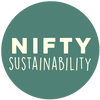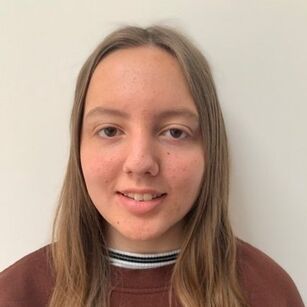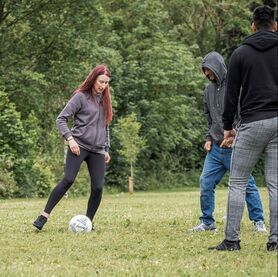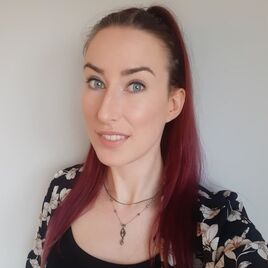|
I have really enjoyed my week of work experience placement with Nifty. I was surprised by the wide range of different projects Nifty is involved in, and I feel that this has given me a real taste for what they do and the ways they work. My placement involved me gaining an understanding of the kind of work Nifty does and carrying out some of my own research in areas that interested me most.
I found the Mixed Ability sports model particularly interesting and completing the introduction IMAS course helped me understand the importance of this model of sports and introduced me to people who have benefitted from being a part of Mixed Ability sports clubs. These personal stories really highlighted how valuable the work Nifty does through their partnership with this organisation. It’s really inspiring how quickly this model has spread to become a global movement of sports and what a large positive impact this has on people’s lives through providing inclusive and welcoming spaces for people to enjoy sports. I found It a valuable experience being able to get involved in some of the research Nifty does and relate it to aspects of my life, such as the research surrounding eco anxiety and how common this experience is in young people’s lives. I was also able to relate the sustainable development goals to my experience of learning about them at college and how important it is for young people to be educated on the importance of the SDGs. After researching how organisations and companies recognise and use the sustainable development goals, I had the opportunity to talk to Nifty about how they use SDGs in a focus group setting. We discussed the different ways the goals can be implemented and alternative frameworks for measuring sustainability that may work better for different business models. Overall my placement with Nifty has introduced me to a range of sustainability projects and concepts that I would like to further explore and work with in the future.
1 Comment
Who we are
Our names are Kitty and Laura and we have just finished our degrees in Sociology and Criminology at Leeds Beckett University. Since completing our degrees we both took part in the graduate programme with Leeds Beckett University to seek advice and gain new skills in the workplace. We both choose Nifty Sustainability for our internship because we are both personally interested in investing our time into more ethical practices such as recycling more, eradicating fast fashion purchases where possible and learning about sustainability as a whole. As well as understanding more about the usefulness of co-production. We are beginning to understand how important this is, especially in today’s climate where large corporations, fashion and technology are more accessible than ever! What we are doing We have both been assigned different tasks within different areas, however, we both have the end aim of gaining insight into what Nifty do, as well as personal reflection around the topic. I (Laura) am currently learning about co-production as a research method and how this relates to IMAS (a mixed ability sport organisation). I began by attending a conference on co-production, transgender males in sport and allyship. The conference was useful as it provided the groundwork into the different types of co-production and the potential issues which allowed me think about how this relates to IMAS. I also completed an online course (created by Nifty) which taught me about the work IMAS do and how they break down barriers for the inclusion of people with disabilities into sport; this is achieved through peer education as educational resources are developed alongside those with disabilities and then provided to other clubs through weekly training sessions. I also attended one of IMAS’s weekly classes. From this, I began to read the current literature on co-production in order to write up a literature review. Whereas I (Kitty) have been focusing on Nifty’s social media accounts, and attempting to put ideas into practice so they utilise these platforms to their full potential. I feel like Nifty sustainability would benefit from creating a small community via different social media, to allow them to encourage and educate people online, and to contribute to the fantastic work they do in real life! Furthermore, I have really attempted to immerse myself into this opportunity, and attended a workshop in Shipley surrounding the ideas of sustainability. I felt this was both necessary and useful, as I was given a deeper insight into why the notion of being more ‘green’ conscious and engaging with our carbon emissions is salient. As fulfilling the needs of today’s society, whilst not compromising the environment for future generations will ensure that the ecosystem and natural resources are able to remain preserved. Who we thought Nifty were When we first sat down together at the ‘get ready for work week’ (held by Leeds Beckett University) we began to discuss what the work experience may entail, yet we both found ourselves asking the same questions - What do Nifty Sustainability do? Who are they and what kind of work would we be doing? We were also unsure about what kinds of organisations would work with them and the role of Nifty specifically. We understood they did research, however, how they manifested this into wider work with corporations was still a question we both had. Despite this uncertainty, we were both excited to discover more about the positioning and function they provided within their consultancy and research work. What we know of Nifty now From being half way through the project we have both gained the answers for our questions and acquired new knowledge on the work Nifty does. We now understand that companies such as IMAS (international mixed ability sport) and the University of Leeds, utilise Nifty’s expertise in the field of social research and educational resources to inform better sustainable practices as well as creating online courses for different organisations. We have realised the vitality of the work Nifty are doing, and how they are helping businesses and organisations make positive social change and therefore making our world a cleaner, more ethical and sustainable place to live in. How has this experience impacted us? We would both like to express how thankful we are for the opportunity at Nifty, and how this internship has helped us to shape our individual values as well as thinking beyond ourselves. We have realised how similar the ethics and principles of this company are to our personal beliefs. The passion for positive social changes align with us, as well as our degrees so we have been placed perfectly to work for Nifty during this time. Within the political and financial fields of today, the work being done at Nifty and similar organisations are often undervalued or overlooked, hence this has reiterated the importance of their work. Another thing we would like to mention is how ethical, inclusive and welcoming the team at Nifty have been to us. This experience would not have been as enjoyable or easy to navigate without Jen, Claire, Becki and the others so we want to give our gratitude for this also. We are excited to see what is to come for our future ventures, as well as Nifty’s… This summer I had the pleasure of completing a 10-week project placement with Nifty Sustainability. The opportunity presented itself through my MSc in Sustainability and Consultancy at the University of Leeds. My time with Nifty involved a consultancy style project with their partnering organisation International Mixed Ability Sport (IMAS). As a keen sportsperson, I was really excited to work with IMAS and help spread their message of inclusive sporting opportunities. My research for IMAS involved exploring the concept of ESG and considering the opportunities it could present them. This offered an exciting research prospect for me, as it would unite my passions of sport and sustainability.
The project process brought some great personal experiences and insights. The first of these involved being invited to IMAS’ weekly catch-up with their trainers; the IMAS trainers are individuals who work and volunteer for IMAS, helping to spread the Mixed Ability message. Meeting these people demonstrated the power of Mixed Ability sport and its impact on society. Hearing the Trainers' passion about Mixed Ability sport helped me reflect on my preconceptions about sport and disability. The experience also demonstrates that inclusion, friendship, and competition are the core values of sport, rather than results and personal achievements. I was also fortunate enough to visit Barnsley College with IMAS. This day involved presentations about IMAS and some inclusive physical activity. It was great to see IMAS’ work first-hand, get involved with some Kin Ball, and experience the College students’ reception to Mixed Ability. My final two weeks of the project placement involved conducting semi-structured interviews with IMAS and Nifty representatives. This was a great opportunity to understand more about IMAS and gain primary data for my project dissertation. These conversations were honest, insightful, and enjoyable. The interviews and observations provided valuable data and analysis for my dissertation. The dissertation due date was the end of August and it kept me busy during the summer months. Despite some difficult days, Claire and Jen were so helpful throughout the whole process - their support and knowledge of academic research and writing was invaluable. I want to express my sincere gratitude to Nifty Sustainability and IMAS for providing such a great placement experience and welcoming me into their organisations. Following this project placement, I started my full-time professional career with the infrastructure company, AECOM. I will reflect on Nifty’s values throughout my future career and pursue work that promotes social value and creates effective change. I will be starting my job in Leeds and look forward to catching up with Nifty and IMAS in person soon! When I started working with Nifty Sustainability in the November of 2020, I was sure I’d somehow misled Jen and Claire into thinking I was more capable than I was. I couldn’t see in myself the qualities they saw in me, the potential they saw, but I decided I wasn’t going to hold myself back, and that I would battle through the doubt, anxiety, and imposter syndrome to hopefully prove to myself that they had made the right choice, even if I didn’t believe it at the time!
When I began work on my first research project, Jen and Claire were wonderful and I couldn’t have asked for better or more supportive mentors. They took time to explain and guide, but most importantly, trusted that I could do what was asked of me, even when I secretly wasn’t sure if I could do it myself. I kept proving my inner critic wrong, with every victory, big or small, I started to believe in myself the way that Claire and Jen believed in me. The moment I noticed the most progress was when I started working on another research project. I realised I was capable of supporting another researcher and helping them during interviews and the various steps to gathering and analysing data, and the biggest surprise of all came when I discovered how much I had improved when writing research summary drafts. The quality of my writing had improved, didn’t have to be reworded or edited as much and the process I used to write the first draft had become more efficient and better suited to my needs. Learning on the job in such an immersive way was really beneficial to my development. I was able to see how Nifty worked and pick up skills through observing, I got involved with practical sessions and open days with IMAS and Unorthobox and attended various online events, and really began to understand the importance of the work we were doing. I even picked up a few hobbies on the way! |
AuthorWrite something about yourself. No need to be fancy, just an overview. Archives
July 2023
Categories |




 RSS Feed
RSS Feed
